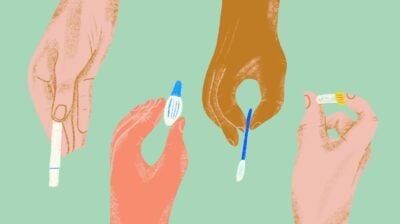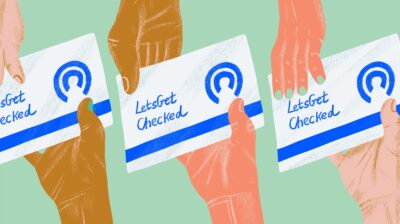Pubic lice: causes, symptoms, and treatments
Pubic lice, also known as crabs, are a common sexually transmitted infection

Pubic lice, also known as crabs, are a common sexually transmitted infection (STI), passed through close body contact. They can cause a lot of irritation and itching and are generally very uncomfortable. Fortunately, it is possible to treat pubic lice effectively. If you think you might have public lice it is important to go for an STI check-up, where you can get the best advice on treatment.
What are pubic lice?
Pubic lice are small, blood-sucking insects that live in coarse hair. They are different to head lice and do not live in the hair on the head. When the lice make it into pubic hair, they lay eggs which stick to the hair. Pubic lice are sometimes called crabs because their two front legs, which they use to hold onto the base of the hair, resemble the claws of a crab.
Adult pubic lice are very small and difficult to see at only 2mm long fully grown.
What are the symptoms of pubic lice?
Symptoms from pubic lice can include:
- Itchy red spots caused by an allergic reaction to the saliva and droppings of the lice – Itching can take 1-3 weeks to develop, and is usually worse at night
- Finding the small insects on your body
- Inflammation of the area from scratching
- Black or brown powder on your skin or underwear (louse droppings)
- Blue spots or specks of blood caused by bites
- Nits (empty egg shells) attached to the base of the hairs
How do you get pubic lice?
Lice crawl from one hair to another and cannot jump, fly or swim. Pubic lice are passed through close body contact with someone who already has them.
- Pubic lice are most commonly passed through close sexual contact, including vaginal, oral, and anal sex
- Other close personal contact may result in lice being passed from one person to another
- Condoms and other forms of contraception cannot prevent you from catching pubic lice
- It’s very rare for pubic lice to be spread through things like clothes, towels or sheets. However, it may be possible, so it’s best to make sure everything is washed to avoid spreading the lice to anyone else
What is the treatment for pubic lice?
As soon as you discover you have pubic lice, you should treat it right away to avoid spreading them to anyone else.
- Pubic lice are treated using an insecticide lotion, cream or shampoo
- All treatments will have their own set of instructions, but most will be applied to your whole body to ensure all of the lice are removed.
- The lotion will be left on for 12-24 hours and then washed off
- This treatment will then be repeated after 3-7 days to make sure any lice that had not hatched before the first treatment are killed off
- After treatment, put on clean underwear and clothing
- To make sure any remaining lice or nits are killed off, machine wash any clothing (at 50 degrees or higher), towels or bedding that were used 2-3 days before treatment
- There are also special treatments for the eyelashes, so make sure to ask for this if you need it. Do not use the other lotion on your eyes
- Your partner or anyone you came into close contact with should also be treated for pubic lice at the same time. Read our article on telling your partner you have an STI for more advice
How do I prevent pubic lice?
As there are no methods of contraception that protect against pubic lice, the only way to reduce the risk is by discussing with all of your partners if they have had lice previously and ensuring you and your partner go for regular STI check-ups. It can also help to look for signs of pubic lice before having sex with someone.
It is best to avoid any sexual contact with partners until all have been checked for pubic lice and/or treated. This helps to avoid a persistent infestation.
Looking after your mental health after an STI diagnosis
If you are diagnosed with an STI, you might feel a mixture of emotions. Unfortunately, there is still stigma in our society surrounding STIs that can cause some people to feel shame about having one. However, like any other healthcare diagnosis, you are not to blame for your STI and have not done anything “wrong”. Being diagnosed with an STI can have a negative impact on your mental health and wellbeing and if you don’t feel comfortable telling friends or family about it, you might feel isolated and alone. If you have found out you have an STI and you’re finding it difficult to cope, there are things you can do to support your mental health.
- Remember that STIs are common and lots of people have one at some point in their life, even though they aren’t talked about a lot
- Take time out to do something you enjoy and practice self-care
- Reach out for mental health support if you need it. If you don’t feel comfortable talking to a friend or family member, our 24/7 anonymous text service, 50808, can help
- Be patient with yourself and allow yourself to feel your emotions. It’s ok to be upset when you find out you need healthcare treatment. It’s important to take the time you need to adjust
Feeling overwhelmed and want to talk to someone?
- Get anonymous support 24/7 with our text message support service
- Connect with a trained volunteer who will listen to you, and help you to move forward feeling better
- Whatsapp us now or free-text SPUNOUT to 50808 to begin.
- Find out more about our text message support service
If you are a customer of the 48 or An Post network or cannot get through using the ‘50808’ short code please text HELLO to 086 1800 280 (standard message rates may apply). Some smaller networks do not support short codes like ‘50808’.






